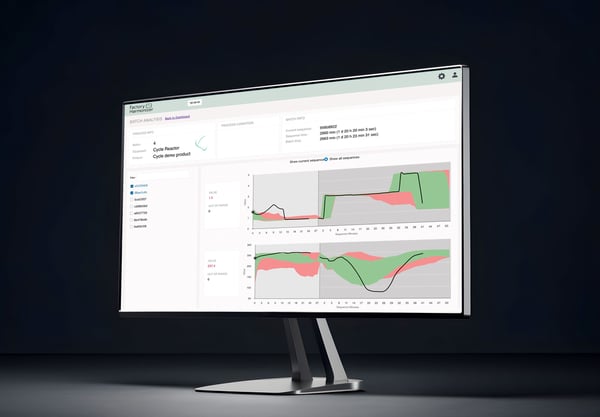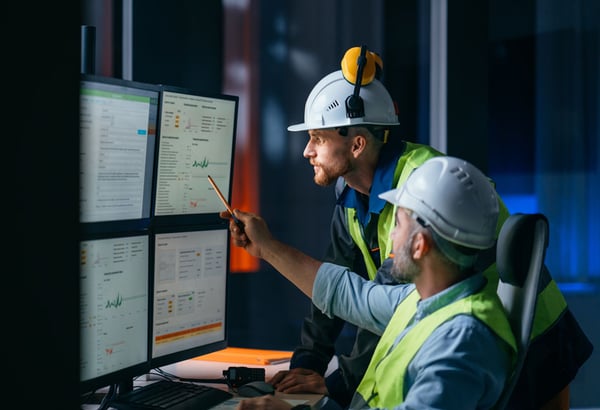For the individual plant out there, it is understandable that the goals of Industry 5.0 may feel distant from one’s own work and production. In this blog post, we aim to bring sustainability closer to you and your production by providing you with seven concrete arguments for pursuing sustainability in the chemical industry.
1. Leading the Way
In the times of Industry 5.0, sustainability isn't just a trend but a strategic necessity. Leading companies that integrate sustainable practices into their operations not only improve their efficiency and reduce costs but also set industry standards. They position themselves as innovators and market leaders by showcasing their ability to think long-term – without a planet with natural resources there is no industry. These forerunners can influence what sustainable practices imply and drive the entire sector towards a more sustainable future.
2. Attracting Investors
Investors are increasingly focused on sustainability. With more than half of individual investors planning to increase their allocations to sustainable investments in the next year (1), stock-listed firms should be keeping their eyes and ears on the prize. ESG (Environmental, Social, and Governance) funds prioritize companies that show resilience and proactive risk management. Regulatory pressures and the financial sector’s emphasis on sustainability should compel companies to adopt responsible practices to attract and retain investor confidence.
3. Enhancing Operational Efficiency
Sustainable practices often go hand-in-hand with increased operational efficiency. By minimizing waste, reducing energy consumption, and optimizing resource use, even smaller producers can significantly cut costs. The UK government’s Department for Energy Security & Net Zero find in their report Unlocking Resource Efficiency that improvements in process efficiencies have the potential to achieve a 6-10% increase in efficiency compared to current levels. Furthermore, the study indicates that unplanned equipment downtime can cause an estimated loss of 5-20% of productive capacity in industrial chemical facilities. Utilizing digital tools like AI to anticipate and prevent or quickly solve problems with operating equipment can significantly increase process efficiency and yields. (2)
4. Meeting Regulatory Requirements
Governments and regulatory bodies worldwide are tightening environmental regulations. Companies that proactively adopt sustainable practices are better prepared for regulatory changes, avoiding financial penalties and reputational damage associated with non-compliance. Adhering to climate regulations, such as the EU’s Fit for 55, is essential not just for compliance but also for maintaining global competitiveness. Fit for 55 is a part of the European Green Deal through which the EU aims to reduce greenhouse gas emissions by 55% by 2030, promoting a sustainable and competitive economy (3).
5. Addressing Workforce Shortages
The chemical industry faces significant workforce shortages, with around 30% of employees nearing retirement and declining student enrollment in engineering. Over the past 15 years, labour productivity has grown by less than 1% annually despite substantial investments (4). To address this, companies must focus on social sustainability to reinvent roles and reshape the workforce through continuous adaptation to technological advancements, comprehensive training, and effective knowledge transfer. By fostering a workplace culture that values employee well-being and professional development, companies can better attract and retain talent, who also increasingly care about the company’s commitment to environmental sustainability (5).
6. Fostering Innovation
Sustainability challenges often spur innovation, pushing companies to think creatively and develop their production. This drive for sustainable solutions can thus result in the development of new or improved products and services to meet the demands of a growing market. A market, where chemical companies are presented with an ideal opportunity: an expected projection of an increase in demand for sustainability-related products by about 70% by 2028 (4). By fostering a culture of innovation centred on sustainability, companies can stay ahead of the competition and capitalize on the expected hypergrowth.
7. Ensuring Long-term Viability
Ultimately, the integration of sustainability into the process industry is about ensuring long-term economic sustainability. The depletion of natural resources and the increasing impact of climate change pose significant risks to the industry. Companies that embrace sustainability are better equipped to mitigate these risks and ensure their long-term survival. Sustainable practices contribute to the resilience and economic stability of the business, making it adaptable to changing environmental and market conditions.
Conclusion: Navigating Obstacles to Achieve Sustainability
While the arguments for promoting sustainability in the chemical industry are clear, obstacles are and will always be present. Companies face technical limitations as well as high costs for developing new production processes. Additionally, the need to comply with stringent regulations and manage the intricate knock-on effects within the value chain adds layers of complexity. (2)
However, by fostering a culture of innovation, leveraging technology, and committing to sustainable practices, these hurdles are just that, hurdles. Embracing these practices not only ensures compliance but is vital for operational efficiency and the long-term viability of production.
Looking for a solution to boost your production efficiency and sustainability? At SimAnalytics, we believe in the synergy of sustainability and profit. With our intelligent monitoring software, Factory Harmonizer, process efficiency is sustainable and resilient.
Footnotes:
- https://www.morganstanley.com/ideas/sustainable-investing-on-the-rise
- https://www.gov.uk/government/publications/unlocking-resource-efficiency
- https://www.consilium.europa.eu/en/policies/green-deal/fit-for-55/#:~:text=Fit%20for%2055%20refers%20to,line%20with%20the%202030%20goal.
- accenture.com/content/dam/accenture/final/accenture-com/document-2/Accenture-Chemicals-Labor-Productivity-Cracking-Conundrum.pdf
- https://www.forbes.com/sites/adigaskell/2021/10/31/employees-demand-that-we-become-more-sustainable/



